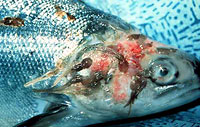|
|
Journals 2003/2004
Sarah Quan
Narragansett High School, Narragansett, RI
"Study of the exchange of waters between the Northeast Atlantic and the Norwegian Sea"
R/V Johan Hjort, Nordic Seas
July 10 - 30, 2003 m
|
July 24, 2003
Latitude: 64º 20.74' N
Longitude: 4º 11.12' W
We passed through international waters today and saw the usual Russian fishing trawlers. They are fishing for herring but much to the dismay of Norwegian sport fishermen since in addition to this being a great spot to be a herring it is also a nursery ground for young salmon. Many young salmon are caught as by catch in the unforgiving trawl nets resulting in fewer salmon retuning to the rivers of Norway to spawn. Norway has more than 600 salmon rivers making it a major salmon nation. Another major threat to the wild salmon population is the parasite sea lice whose population runs rampant as a result of aquaculture operations. The unnaturally high density of penned fish sustain huge numbers of parasites in and around the sea cages that dot the fjords. When young wild salmon pass by they are easy prey for the lice that attach themselves to the salmon's scales eating away the protective biofilm on their skin reducing their growth and opening them to infection. Sea lice thrive in salty water and die in fresh. Normally in the spring as young salmon are heading out the fjords to sea there is a thick layer of fresh melt water floating atop the more dense saltwater. This provides the salmon a safe freeway to the sea. Hydroelectricity has decreased the natural spring flow of fresh water into the fjord saving it for summer behind a dam. The freshwater layer is not thick enough to thwart the sea lice resulting in a near impossible gauntlet for salmon to swim through. It is surprising that man's efforts to solve environmental problems, in this case over fishing and dependence on fossil fuels, results in a whole new set of environmental repercussions.

|
|